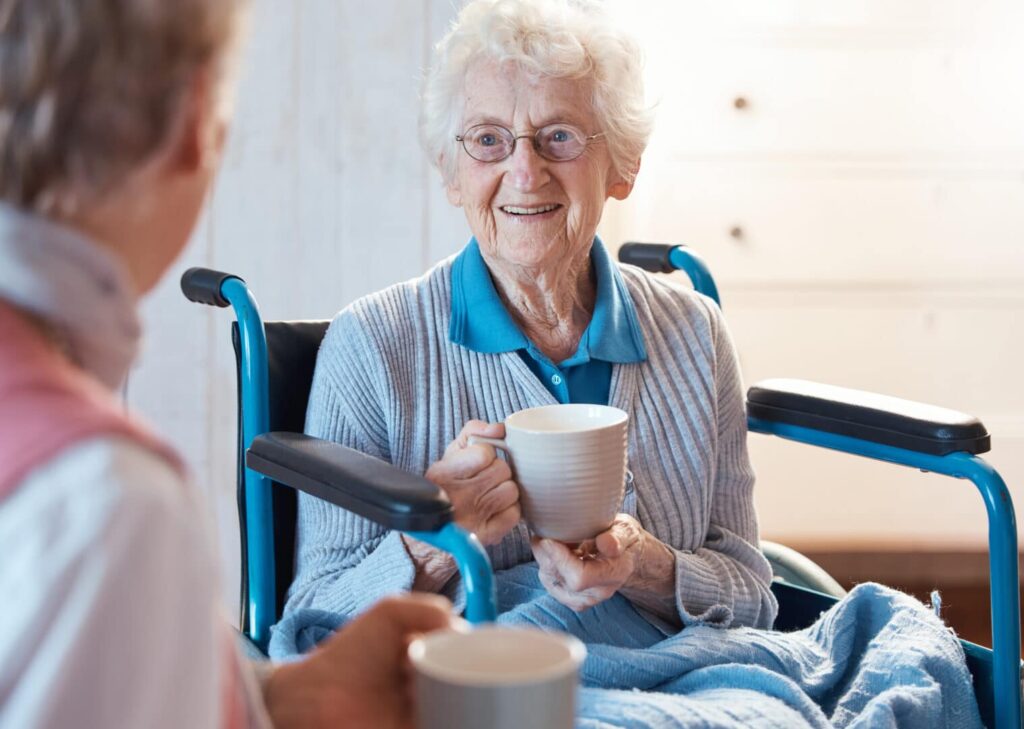We’ve asked the experts about how you can make the transition into residential aged care as positive as possible for your loved one.

Moving into residential aged care is a BIG step for many older Australians. Here’s how you can help your loved one successfully settle in:
Before the move
Have early and ongoing discussions
It’s completely normal to be apprehensive about change. Moving into an aged care home can be a daunting concept for many people. Anxiety about losing independence and adjusting to different surroundings and routines is commonplace.
The earlier you start discussing aged care with your loved one, the better. Choose moments when they are relaxed, and when you have time to listen without distractions.
Talk about fears and uncertainties, set expectations, and take the time to weigh up options and make plans. Open ongoing discussions can help your loved one maintain a sense of control, give you time to work through solutions to any issues that arise and significantly reduce stress for everyone.
Focus on the positives
It’s important for your loved one to understand that the main goal of moving into an aged care home is to maximise their quality of life. Residential aged care has plenty of benefits.
When chatting about the move you can point out these positives:
- Comfortable accommodation they can embellish with personal items and décor.
- No more chores – household tasks like cleaning and laundry will be a thing of the past.
- Delicious, nutritious meals delivered to their room three times a day.
- Social opportunities and activities with new friends
- Compassionate aged care workers happy to help them with personal care.
- Round-the-clock access to nursing and medical professionals
- Visitors are welcome, and family are only a phone call away.
- Creature comforts are available at some facilities, including specialised meals, pay TV and other perks.
- Security and peace of mind that they will always be safe and well looked after.
Read more:
What do aged care homes provide? – Aged Care Decisions
Tour facilities – both before and after choosing a room
At Aged Care Decisions we absolutely recommend facility tours – and we can book tours on your behalf as part of our free service. On a facility tour you’ll get a first-hand look at the rooms, common areas and facilities, you can meet staff members, view the activities program, and check out the menu offered to residents.
A personal tour is the best way to learn as much as possible about each aged care facility you are considering, and after visiting their potential new home, your loved one will have a good sense of the surroundings and community they’ll be moving into.
This handy checklist lists the most important things you need to notice and evaluate.
Once you’ve accepted a room, take your loved one to visit their chosen facility a few times before moving day. Get to know staff members, introduce them to fellow residents and familiarise them with the layout and features of the facility.
Comfort and confidence can be found in familiarity.
Book a respite stay
A short, temporary stay in an aged care facility can be used as a ‘try before you buy’ opportunity and the familiarity it offers can help with the settling in process when a permanent move occurs.
Eligible seniors can access up to 63 days of subsidised respite care each year. If you have the luxury of time before placement becomes urgent, and if your loved one is eligible, respite care is a great way to sample and become familiar with a facility.
Read more about respite care:
The pros and cons of residential respite care for seniors (agedcaredecisions.com.au)
Aged Care Decisions’ 100% FREE aged care matching service can help you find aged care and respite care vacancies.
Our custom-built software together with our Placement Specialists can match your location, budget, care needs and personal preferences with providers that suit your specific needs.
Connect with us to receive a FREE personalised aged care Options Report.
On moving day
Make moving day positive and fun. Encourage your loved one to pack photos and favourite items from around their house, along with their clothing and essentials. Familiar toiletries, a vase of flowers from their garden, their regular teacup and a much-loved pillow or blanket can make their new room feel more like home.
Spend quality time with them during moving day. Help them choose activities they’d like to participate in, and explore dining rooms, libraries, and outdoor areas.
Be sure to check in with them during the evening and again in the morning as they wake up for the first time in their new home.
After the move
Visit regularly – especially in the early days
Many people feel trepidation about moving into aged care because they fear loneliness, isolation and separation from family and friends.
Visiting your loved one regularly, especially in the early days, can ease these fears and make them feel supported, important, and loved.
It won’t be long before they’re settled into their new home, and all going well, they’ll be busy with events, activities, and new friends, and not so dependent on your visits.
Do be aware though, that visiting too regularly may prevent them from participating in activities and integrating into their new social environment. A chat with the Leisure Coordinator at the facility may help you strike the right balance when it comes to planning visits.
Schedule outings
Day trips and outings will give your loved one something to look forward to, and ensure they still feel connected with the people and places they enjoy.
Plan visits with other family members, shopping trips, movie afternoons or outings to the park – whatever your loved one likes most.
Getting out and about will help them appreciate that they aren’t confined to their new home and are still connected to the world outside.
Check in with facility staff
Talk with care staff and management whenever you get the opportunity. They will get to know your loved one well and can keep you informed about any issues that arise, as well as your loved one’s general wellbeing.
Advocate for your loved one
Advocating for your loved one becomes increasingly important as they age, and particularly as they adjust to life in residential aged care.
Continue to talk openly and honestly with your loved one and take time to understand any concerns or wishes they have. Ensure they feel comfortable, valued, and confident that you will speak or act on their behalf when necessary.
The Older Persons Advocacy Network offers free, independent, and confidential support for older people and their loved ones who are experiencing the transition into aged care. You can contact them here: Older Persons Advocacy Network – OPAN – Australia wide support or call 1800 353 374.
Aged Care Decisions helps thousands of Australian families navigate all stages of the aged care journey.
Our service is 100% FREE, 100% independent, and 100% personal.
We do the running around for you, reducing stress and hassle, and at ZERO cost to you.







